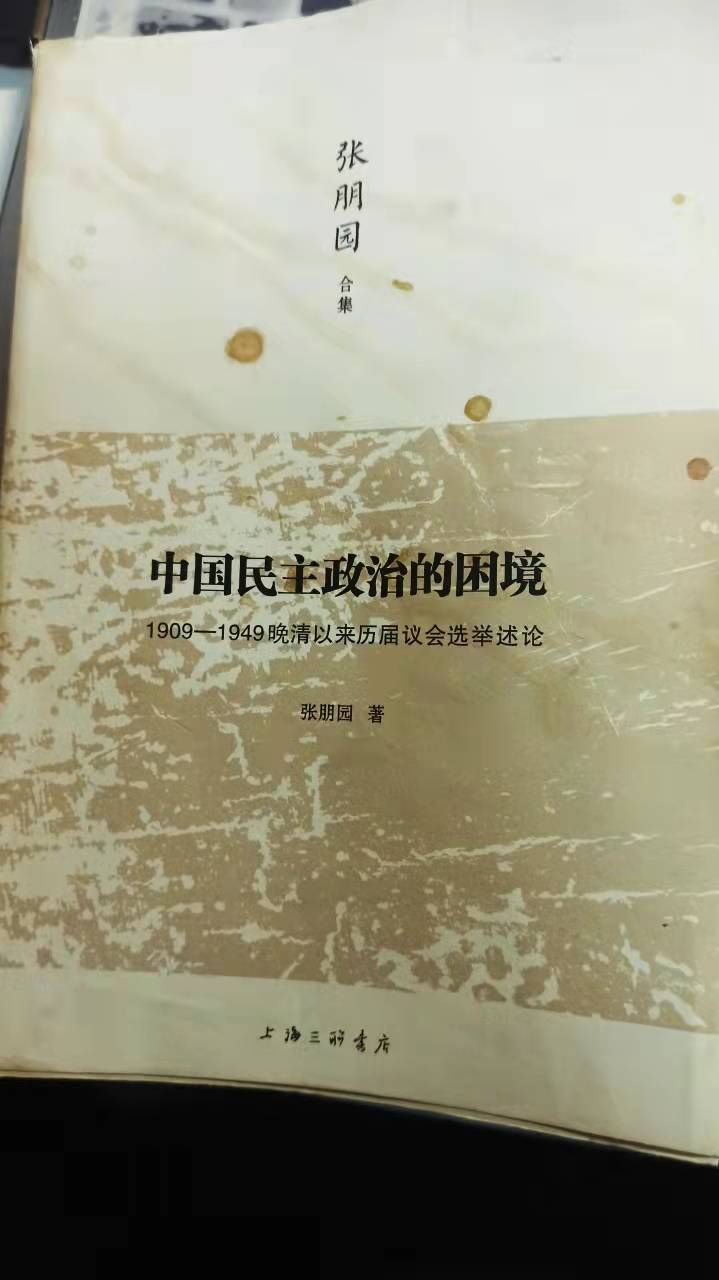
海角一隅,生於斯,長於斯。試圖在混沌中找出秩序,在文字中成全自身。讀書、寫作,其實都是生活的一種方式,藉此展現生命的歷程。
Notes on "The Dilemma of Chinese Democracy: A Review of Parliamentary Elections from 1909 to 1949 Since the Late Qing Dynasty"

I have been reading this book I borrowed by chance these days, "The Dilemma of Chinese Democracy: A Commentary on Successive Parliamentary Elections from 1909 to 1949 in the Late Qing Dynasty", authored by historian Professor Zhang Pengyuan. The book collects and sorts out the process of the introduction of democratic political ideas into China since the late Qing Dynasty, and sorts out the general situation of four parliamentary elections, including the constitutional reform initiated by the late Qing government in response to the wave of public opinion in 1909 and the subsequent consultations. The election of the Bureau and the Senior Council; the first parliamentary election in the second year of the Republic of China in 1913; the second parliamentary election under the Beiyang government of Duan Qirui in the seventh year of the Republic of China in 1918; the election of the National Assembly held by the Kuomintang in 1948 .
The introduction of the book first describes that since the Opium War in the 1840s, officials, intellectuals, foreign missionaries, etc. have successively introduced the ideas of parliaments of various countries to China. From the well-known Lin Zexuqi to Zheng Guanying, Kang Youwei, Liang Qichao, and even one. The officials who study abroad have gone from envying the parliamentary politics of foreign countries to wishing to imitate the practice. The reason for their respect for the parliament is probably that they can use it to reach out to the situation, check and balance the monarchy and the government to protect the people, build a common trust and unite the country, and so on. Moreover, after synthesizing the experience of various countries, the British constitutional monarchy parliamentary system is recognized as the most suitable model for implementation in China. Then there were the first constitutional and parliamentary elections in the late Qing Dynasty.
However, the response to the first election was rather cold, because the threshold for becoming a voter was quite high, not only a wealthy net worth, but also experience in education, public office, and public welfare undertakings. Simply a difficult qualification to meet. Despite the indifference and bribery from time to time, it is surprising that there are so-called "modest gentlemen" and comity to seats in the election. This may be related to the traditional gentry atmosphere and the lack of popular election culture at that time. In the following elections, this was not the case. Various bribery, black-box operations, and secret nominations and assignments emerged one after another. One person swept thousands of votes, used primary and secondary school students to "copy votes", and lied about the population of the region to win more seats. In order to ensure full control of the seats, the Kuomintang did not hesitate to "dissuade" unexpectedly elected candidates and other absurd situations. Several attempts have been unsuccessful. China's parliamentary politics has only become a door-dressing tool for those in power to strengthen the legitimacy of their rule.
The book also emphasizes the overall knowledge level of the people, the national economic level, the comprehensiveness and accuracy of the census, and the importance to parliamentary politics. I also agree that the mature and healthy development of parliamentary politics is the result, not the cause, of national development and progress. The country's legal system is incomplete, government affairs are low, and it is difficult to have clear parliamentary politics. This cannot be changed by simply grafting on foreign systems.
Like my work?
Don't forget to support or like, so I know you are with me..
Comment…